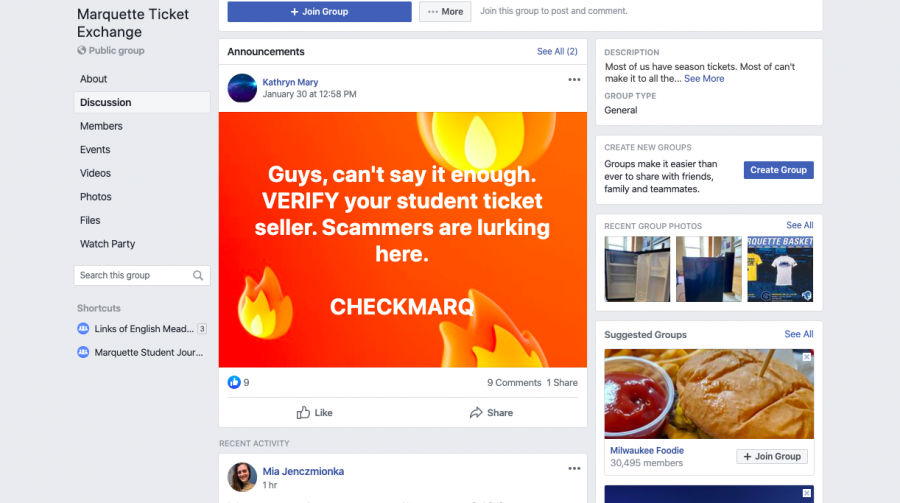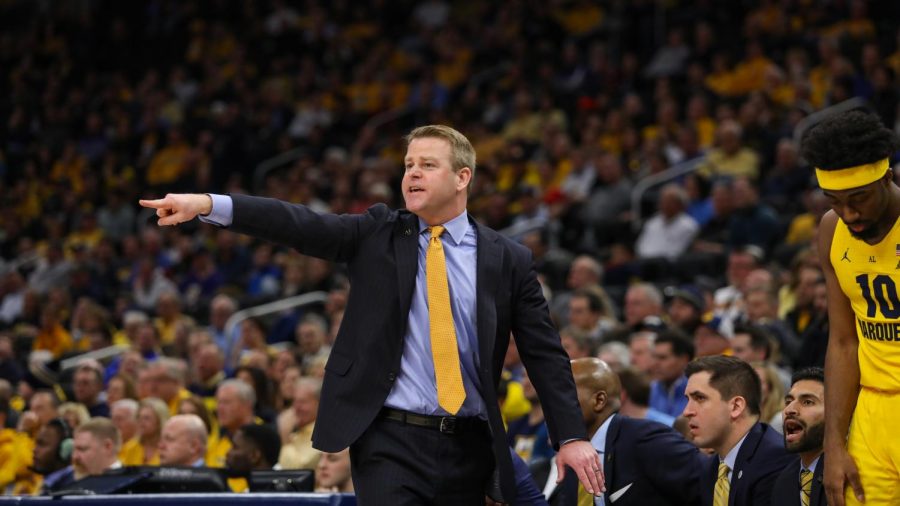There are times when Marquette basketball season ticket holders can’t attend every game, and times when non-season ticket holders might want a few extra tickets for friends or family. Many students and alumni turn to the Marquette Ticket Exchange Facebook group to buy and sell their tickets. Recent posts on the Facebook group suggest that there have been more ticket scams popping as of recent.
The Facebook group is public, so virtually anyone can join. It has no official affiliation with the university, athletic department or ticket office. The group is set up so that any member can invite and add new members into the group.
The group is also used for other things, such as subleasing apartments.
1985 College of Arts & Sciences alumna Mary Kriss said she is a “lifetime MU basketball fan” and a “longtime season ticket holder.” She said she has been the page’s moderator for about a year.
Kriss said the page was created in 2006 by Joey Woelfel, a first-year student at the time. He was moderator until Kriss took over.
“While I have been an active user of the group, I cannot say I noticed or was aware of ticket scamming when the group was young,” Kriss said in an email.
Kriss said she believes there will always be opportunists looking to take advantage of people.
“Social media and payment apps simply give scammers new tools to present themselves as someone they are not,” she said in an email. “Given my short tenure as group moderator, I honestly cannot say whether or not there are more scams now than there were in the past.”
As moderator, Kriss said the primary thing she can do is to remind the group’s members that there are scammers and to emphasize the importance of verifying the people you are making transactions with.
“Another thing I can do is screen users asking to join the group,” Kriss said in an email. “After awhile, it is easy to detect fraudulent profiles — stock photos, no friends, profile recently created, data that does not add up. Many bot accounts simply are not convincing.”
Kriss said she has never experienced a scam herself, but she reports the scams that students tell her about. She said many students experience scammers who insist on payments first before a ticket transfer, then accept the money, block the buyer and “vanish.”
“I also get reports of students pushing back on suspicious interactions, catching them in their scam,” Kriss said in an email. “Some post their story for the group to see, which is the best information of all! The group can only benefit. The more information, the better.”
She said violators are removed from the group, blocked and reported to Facebook.
Brooke Borowiak, a 2013 College of Arts & Sciences alumna, said she has experienced ticket scams on Facebook before. She said she believes the group might function better as an escrow service, where sellers would transfer their tickets to the site before a sale can be made.
“(This) would be the most secure approach,” Borowiak said. “Some sort of identity verification requirements for sellers would also go a long way toward protecting buyers from scammers. We all know that students who are season ticket holders try to make a few dollars extra when they sell tickets they aren’t using. A lot of people are okay with paying that higher price, but if there were a safe way to do this, rather than just random internet purchases from people who may not be who they say they are.”
Borowiak said she avoids scams by only buying from reputable sellers.
“If you are going to take the risk and purchase tickets somewhere like Facebook, try to go through friends or others in your social network,” Borowiak said. “If you are going to make a purchase from someone you don’t know, check out their Facebook page. Do they have people that have posted on their page? Are they the only people that comment on their posts? Do they have photos with other people?”
Borowiak said another way to combat scams would be to make the Marquette Ticket Exchange group private, which may prevent access to members of the Marquette community.
Marquette University Police Department assistant chief Jeff Kranz said that no one has contacted MUPD for issues regarding Marquette University basketball in particular. However, he said people have drawn attention to scamming incidents involving Bucks tickets.
He said there are challenges with crimes that occur online, especially if a perpetrator is not from the area. However, he encouraged those experiencing issues on the Marquette Ticket Exchange Facebook group to contact MUPD with any concerns they might have.
“Share. Share. Share,” Kriss said in an email. “Post (about) suspicious activity, so others are aware how the scams operate. Exposure is their bane.”
This story was written by Alexa Jurado. She can be reached at [email protected].





